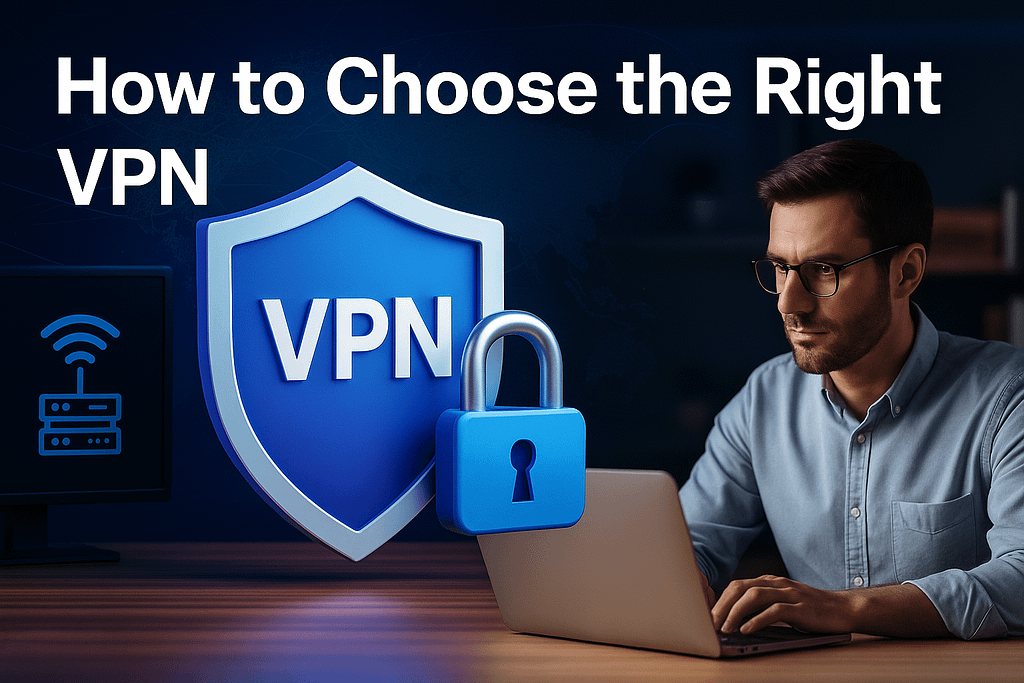
Introduction: Choosing Is Not Just Buying—It’s Understanding
In our previous article, we explained what a VPN is and why it has become an essential tool for securing privacy, bypassing geo-restrictions, and staying safe on public networks. Now that you understand why a VPN matters, it’s time to face the next question:
Which VPN should you choose?
Unlike what ads suggest, a VPN should not be selected based on speed, number of servers, or monthly price alone. The right provider depends on your real-life usage:
Are you a remote worker? Do you need stable IP access? Do you want complete anonymity? Each case requires a different solution.
1. Jurisdiction and Privacy Policy
Every VPN company operates under the laws of the country where it is registered. This determines whether it could be forced to hand over user data to governments or third parties.
Look for:
- Providers based outside surveillance alliances like the “Five Eyes” (e.g., Switzerland, Panama, BVI)
- A strict no-logs policy, ideally verified by third-party audits
Example:
A VPN based in Switzerland is under stricter privacy laws and less likely to be compelled to monitor users.
2. Connection Protocols and Encryption Standards
The connection protocol controls how your data is encrypted and transmitted.
Common VPN Protocols:
| Protocol | Key Characteristics |
|---|---|
| WireGuard | Modern, fast, low resource usage |
| OpenVPN | Time-tested, highly secure, customizable |
| IKEv2/IPSec | Ideal for mobile users, fast to reconnect |
Most reliable VPNs also use encryption standards like AES-256 or ChaCha20.
3. Static vs. Dynamic IP: Which One Do You Need?
Many users overlook this part, but it’s crucial to understand.
- Dynamic shared IP: Your IP changes regularly and is shared with many users. Good for privacy and everyday use.
- Static shared IP: Same IP each time, shared with a group. Useful for slightly more consistent access.
- Dedicated static IP: A fixed IP only for you. Necessary if you access secured systems that require IP allowlisting.
Example:
A developer accessing corporate servers on AWS (Amazon Web Services) may need a dedicated static IP because most cloud infrastructures restrict unknown or changing IPs.
4. VPN Protocols: Speed vs. Security
Not all VPNs use the same technology. Choosing the right protocol impacts how secure and fast your connection will be.
- OpenVPN: A highly secure open-source protocol. Slightly slower but very reliable.
- WireGuard: Newer and much faster than OpenVPN, with modern encryption.
- IKEv2/IPSec: Good for mobile use due to its stability when switching networks.
- L2TP/IPSec: Older, more widely supported but not recommended if privacy is your top concern.
Tip: Many providers let you switch protocols in the app settings. Test each to see which gives you the best balance.
5. Multi-Device Support and Platform Compatibility
A VPN is only useful if it works where you need it. Make sure the provider supports:
- Windows, macOS, Android, iOS, Linux
- Browser extensions for Chrome, Firefox, or Edge
- Smart TVs, routers, and gaming consoles (via manual setup)
Check how many simultaneous devices are allowed — most users need at least 5.
6. International Servers and Bypassing Geo-Restrictions
If you want to unlock streaming services or shop globally, you’ll need wide server coverage.
Look for:
- Servers in key countries: e.g., US, UK, Japan, Germany
- Optimized servers for Netflix, Hulu, BBC iPlayer, Amazon Prime
- Obfuscated servers to bypass censorship in countries like China or the UAE
7. Price, Trials, and Refund Policies
VPNs range from free to premium — but beware of hidden costs.
- Avoid completely free VPNs: they may sell your data or inject ads.
- Look for a money-back guarantee (usually 30 days).
- Some offer free trials with limited data or time.
Tip: A yearly plan often saves 50% or more compared to monthly billing.
Final Thoughts: What Really Matters
Choosing a VPN should align with your specific use:
- Casual browsing → Look for ease of use, mobile apps, and cost.
- Streaming or gaming → Focus on speed and server coverage.
- Privacy-first users or professionals → Choose providers with no-logs, strong encryption, and independent audits.
Recommended VPN Providers (Based on Real Needs)
We’ll explore individual VPNs in upcoming reviews, but here’s a preview of well-rated options:
| Provider | Best For | Key Features |
|---|---|---|
| NordVPN | Overall Security | No-logs, double encryption, WireGuard |
| Surfshark | Multiple Devices | Unlimited connections, budget-friendly |
| ExpressVPN | Streaming Performance | Fast servers, strong geo-unblocking |
| Mullvad | Full Anonymity | No email needed, pay with cash or crypto |
All of these support Japan-based servers and have English interfaces.
Final Thoughts: Choosing the Right VPN Is a Strategic Decision
Selecting a VPN is not just a matter of features or pricing—it’s a matter of digital trust. Whether you’re navigating casual browsing, securing sensitive work data, or bypassing global restrictions, the right provider should align with your actual use case and risk profile.
While this overview helps narrow down strong contenders, deeper evaluation is essential. In upcoming articles, we’ll analyze each of the VPNs mentioned above individually—exploring jurisdiction policies, technical performance, cross-platform usability, and region-specific considerations, including how they perform when used from Japan or accessed internationally.
Understanding your needs is the first step. Choosing the right service is what keeps your connection private, consistent, and future-ready.